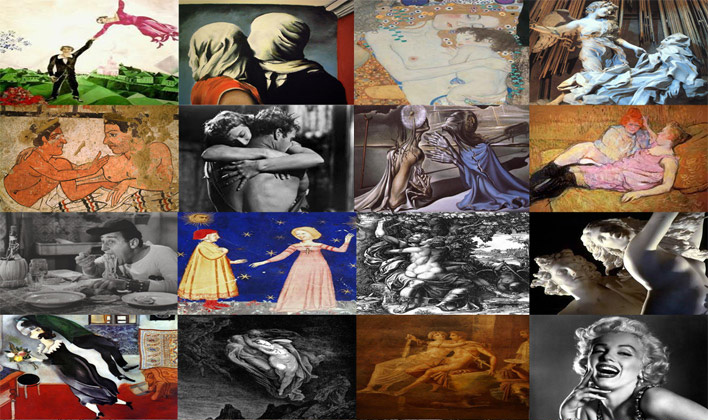Metamorphosis as a Figure for ‘Impure’ Desire. Venus and Adonis between Poetry and Performance
Abstract
The essay analyses the different figures of desire in Shakespeare’s Venus and Adonis. Through the analysis of the rhetorical strategies, and the intertextual resonances, it examines the function of metamorphosis in the interaction between language and performative dynamics, with reference to the recent Italian rewriting and representation of the text made by Valter Malosti. Metamorphosis is read as a figure of ‘impure’ desire not only as it makes identities more fluid and interchangeable, by challenging individual and social roles (such as male/female, active/passive, divine/human, nature/culture etc.), but also as it contributes to break the dichotomy between realty and ideal, and between life and death, by emphasizing the strength of the passions – enhanced by the relationship between poetry and performance – against death and reification.
Downloads
References
Barthes, Roland, Fragments d’un discours amoureux, Paris, Seuil, 1977, tr. it. Frammenti di un discorso amoroso, Torino, Einaudi, 2001.
Bate, Jonathan, Shakespeare and Ovid, Oxford, Clarendon Press, 1993.
Burrow, Colin, «Shakespeare the Poet», The New Cambridge Companion to Shakespeare, Eds. Margareta de Grazia – Stanley Wells, Cambridge, Cambridge University Press, 2010: 91-105.
Butler, Judith, Subjects of Desire: Hegelian Reflections in Twentieth-Century France, New York, Columbia University Press, 2009, tr. it. Soggetti del desiderio, Bari, Laterza, 2009.
Callaghan, Dympna, «The Book of Change in a Time of Change: Ovid’s Metamorphosis in Post-reformation England and Venus and Adonis», A Companion to Shakespeare's Works, Volume IV: The Poems, Problem Comedies, Late Plays, Eds. Richard Dutton – Jean Howard, Oxford-Malden, Blackwell, 2006: 27-45.
Coetzee, John, Elizabeth Costello, London, Secker & Warburg, 2003.
de Klerk, Eugene, «The Poverty of Desire: Spivak, Coetzee, Lacan and Postcolonial Eros», Journal of Literary Studies, 26.3 (2010): 65-83.
Desmond, Marilynn, Ovid’s Art and the Wife of Bath. The Ethics of Erotic Violence, Ithaca-London, Cornell University Press, 2006.
Detienne, Marcel, Les Jardins d'Adonis. La mythologie des aromates en Grèce, Paris, Gallimard, 1972, tr. it. I giardini di Adone, Milano, Cortina, 2007.
Doebler, John, «The Reluctant Adonis: Shakespeare and Titian», Shakespeare Quarterly, 33.4 (1982): 480-490.
Duncan-Jones, Katherine, «Look Here, Upon this Picture, and On This: Venus and Lucrece», In the Footsteps of William Shakespeare, Ed. Christa Jansohn, Lit Verlag, Munster, 2005, 2 vols., I: 89-102.
Feldherr, Andrei, Playing Gods. Ovid’s Metamorphosis and the Politics of Fiction, Princeton-Oxford, Princeton University Press, 2010.
Frangoulidis, Stavros, Roles and Performances in Apuleius’ Matamorphosis, Stuttgart-Weimar, Metzler, 2001.
Fusillo, Massimo, Il dio ibrido, Bologna, il Mulino, 2006.
Grady, Hugh, Shakepseare’s Universal Wolf. Studies in Early Modern Reification, Oxford, Clarendon Press, 1996.
Harris, Jonathan G., «Four Exoskeletos and no Funeral», New Literary History, 42.4 (2011): 615-639.
Hillman, David, «Homo Clausus at the Theatre», Rematerializing Shakespeare. Authority and Representations on the Early Modern English Stage, Eds. B. Reynolds – W. West, Basingstoke, Palgrave, 2005: 161-185.
Hughes, Ted, Shakespeare and the Goddess of Complete Being, London, Faber and Faber, 1992.
Jacobson, Miriam, «The East as Poetic Commodity in Shakespeare’s Venus and Adonis», Literature Compass, 8.1 (2011): 15-27.
Kolin, Philip C., Venus and Adonis. Critical Essays, New York-London, Garland, 1997.
Lacan, Jacques, Le transfert : 1960-1961, Paris, Seuil, 1991.
Langley, Eric, «’And Died to Kiss his Shadow’. The Narcissistic Gaze in Shakespeare’s Venus and Adonis», Forum for Modern Language Studies, 44.1 (2008): 12-26.
Malosti, Valter, Shakespeare. Venere e Adone, ripercorsi, Roma, 2008.
Marenco, Franco, La parola in scena, Torino, Utetlibreria, 2004.
Orlando, Francesco, Per una teoria freudiana della letteratura, Torino, Einaudi, 1973.
Recalcati, Massimo, Ritratti del desiderio, Torino, Bollati Boringhieri, 2012.
Rice, Colin, Ungodly Delights. Puritan Opposition to the Theatre (1576-1633), Alessandria, Dell’Orso, 1998.
Roe, John, «Ovid ‘renascent’ in Venus and Adonis and Hero and Leander», Shakespeare’s Ovid, Ed. A. B. Taylor, Cambridge, Cambridge University Press, 2000: 31-48.
Shaughnessy, Robert, The Routledge Guide to William Shakespeare, London, Routledge, 2012.
Spurgeon, Caroline, Shakespeare’s Imagery and What it Tells Us, New York, Cambridge University Press, 1935.
Thorne, Alison, Shakespeare. Looking through Language, Basingstoke-London, Macmillian Press, 2000.
Copyright Notice
You are free to copy, distribute and transmit the work, and to adapt the work. You must attribute the work in the manner specified by the author or licensor (but not in any way that suggests that they endorse you or your use of the work).









